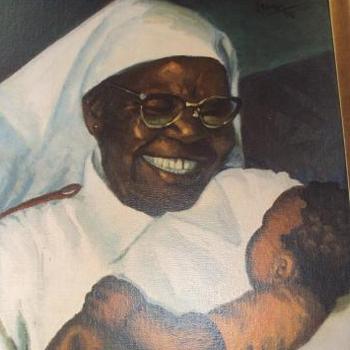DOCTOR OF NURSING (HONORIS CAUSA)
 Nursing pioneer Dora Nginza established the first professional health service in the Port Elizabeth township of New Brighton and opened a path into the nursing profession for thousands of black people.
Nursing pioneer Dora Nginza established the first professional health service in the Port Elizabeth township of New Brighton and opened a path into the nursing profession for thousands of black people.
She entered the field of nursing at a time when only the traditional roles related to womanhood, motherhood and domesticity were considered acceptable for young women in African society. She went on to establish a comprehensive, modern health service in an impoverished community more familiar with witchcraft and superstition, and generally ignorant about health care.
Dora Nginza was born on the farm Baviaanspoort near Cradock on 17 October 1891. She trained as a nurse at the Victoria Hospital in Lovedale under the tutelage and mentorship of Dr Neil MacVicar. He was a pioneer who trained the first two black professional nurses in South Africa, at Victoria Hospital, and it was under the influence of one of these nurses, Tandiwe Jacobs, that the young Dora was recruited into the three-year nursing education programme. She passed the qualifying examination for registration as a nurse at the Port Elizabeth Provincial Hospital.
In 1919 she became the sole health visitor in New Brighton, a township of some 7 000 inhabitants. Woman-alone, Sister Dora had the mammoth task of rendering a health care service to this community of mostly poor, ignorant people in the grip of superstition and prejudice. From her clinic housed in an Anglo-Boer War army barracks, she cared for the ill, dispensed medicine, educated pregnant women and mothers, and delivered and nursed babies. She single-handedly delivered a service which today would be called comprehensive health care and be delivered by a multi-disciplinary team of professionals.
A major breakthough, and early recognition of her work, came only months later during the typhus fever epidemic. Medical practitioners were unable to diagnose the nature of the disease but Sister Dora correctly identified typhus as the cause of the epidemic. Doctors gave her recognition for this breakthrough and Dr Tennyson Oates, the District Surgeon, admitted that she had taught him how to recognise the disease on a black person.
Working alone and with scanty resources, Sister Dora was nurse, cleaner, messenger, dispenser and cook. She was praised in the 1919-1921 Native Affairs Report: "The excellent progress of the medical service in New Brighton is a remarkable thing. The experiment of taking black nurses into service is a great success and largely due to the efficient, purposeful work of the matron, Miss Dora Jacobs."
In recognition of her excellent progress, the authorities relocated the clinic to larger premises with facilities to accommodate 18 patients, and supplied Sister Dora with a staff of one assistant nurse, a cook and a messenger-cleaner. In 1923, with the incorporation of New Brighton into the Port Elizabeth municipality, the patients were transferred to the provincial hospital. This allowed Sister Dora to proceed with a community health service.
Her husband, Headman John Henry Nginza, was first city representative of the Gaika people. When he died in 1943 a new headman had to be found and in 1945, the Paramount Chief of the Ama-Rarabe bestowed the chieftainship on Dora Nginza. She retained her position until her death, conferring and deliberating with her male counterparts on civic matters, leading delegations and giving guidance.
In her service to the community, Sister Dora maintained the highest standards of patient care and expected the same of those working with her. Her contributions resulted in her receiving numerous awards and accolades. She was named A! Nobantu (Mother of the Nation) and the Newell Congregational Church hall was named A! Nobantu Hall in her honour. The New York Council for African Affairs presented her with a gold watch - the first time the award had gone to an African woman - for exceptional service to black communities and the South African Nursing Association awarded her honorary life membership.
The 800-bed Dora Nginza Hospital in Port Elizabeth, opened in 1979, was named in her honour - testimony to her commitment to her profession and her community.
The University of Port Elizabeth honours the outstanding contributions of Sister Dora to the development of health care in the city with the awarding of the posthumous degree Doctor Curationis honoris causa.